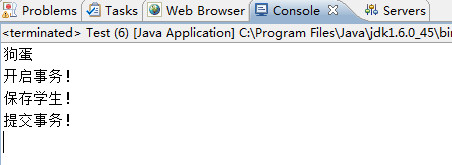一、使用注解的DI实现
1.@Resource
使用该注解能够实现引用型属性的DI实现,该注解能够根据属性名和属性类型自动给属性赋值。一般使用@Resource(name="student")的形式明确指定名称,这样就只能根据属性名来填充值了。
步骤:
(1)导入命名空间:命名空间示例

1 <?xml version="1.0" encoding="UTF-8"?> 2 <beans xmlns="http://www.springframework.org/schema/beans" 3 xmlns:xsi="http://www.w3.org/2001/XMLSchema-instance" 4 xmlns:context="http://www.springframework.org/schema/context" 5 xsi:schemaLocation="http://www.springframework.org/schema/beans 6 http://www.springframework.org/schema/beans/spring-beans-2.5.xsd 7 http://www.springframework.org/schema/context 8 http://www.springframework.org/schema/context/spring-context-2.5.xsd"> 9 10 <context:annotation-config/> 11 12 </beans>
(2)导入依赖注入的注解解析器
<context:annotation-config></context:annotation-config>
(3)将bean导入进来,例:
<bean id="person" class="com.kdyzm.spring.di.Person"></bean> <bean id="student" class="com.kdyzm.spring.di.Student"></bean>
示例配置文件:
<?xml version="1.0" encoding="UTF-8"?> <beans xmlns="http://www.springframework.org/schema/beans" xmlns:xsi="http://www.w3.org/2001/XMLSchema-instance" xmlns:context="http://www.springframework.org/schema/context" xsi:schemaLocation="http://www.springframework.org/schema/beans http://www.springframework.org/schema/beans/spring-beans-2.5.xsd http://www.springframework.org/schema/context http://www.springframework.org/schema/context/spring-context-2.5.xsd "> <!-- 该标签位置不能改变 --> <context:annotation-config></context:annotation-config> <!-- 使用该注解的话不需要再在xml文件中进行配置了 --> <bean id="person" class="com.kdyzm.spring.di.Person"></bean> <bean id="student" class="com.kdyzm.spring.di.Student"></bean> </beans>
注意事项:如果类中包含标准类型的属性变量,同时需要spring该该属性赋初值,那么该类就不能使用注解的形式给属性赋初值了。
2.@PostConstruct
该注解表名init方法,相当于bean标签的init-method属性的功能。
3.@PreDestroy
该注解表名destroy方法,相当于bean标签的destory-method属性的功能。
4.@Autowired
该注解是spring的注解,能够根据类型自动匹配。
5.@Qualifier(有疑问,注解的使用有问题)
该注解也是spring的注解,能够根据名称自动匹配
也就是说Autowired注解和Qualifier注解两个注解的功能合起来才能够顶的上Resource注解的功能,所以对于这两个注解,只是需要知道就行了,不需要进行掌握。一般使用Resource注解就足够用了。
6.@Component
该注解是spring的注解;用于扫描类并将其纳入spring容器中管理。功能相当于xml中的bean标签。
配置方式:同样需要导入依赖注入的注解解析器
<context:component-scan base-package="com.kdyzm.spring.annotation.scan"></context:component-scan>
@Component可以细分为三个部分:@Repository、@Service、@Controller,对应着持久化层、服务层、控制层,用法和@Component相同,推荐使用后者,原因是被注解的类或许能够更好地被工具处理或者与切面进行关联。
二、spring中的继承
1.使用普通方法的继承创建子类对象之后不能继承父类的成员变量,调用父类的get方法也不能获取父类的成员变量。指定bean的parent属性能够解决该问题。
<bean id="person" class="com.kdyzm.spring.extend.Person"> <property name="name" value="Person"></property> </bean> <bean id="student" class="com.kdyzm.spring.extend.Student" parent="person"></bean>
2.使用abstract属性标记bean为抽象bean,这样spring就不会实例化该bean了。
<bean id="person" class="com.kdyzm.spring.extend.Person" abstract="true"> <property name="name" value="Person"></property> </bean>
疑问:abstract属性默认值是true?并不管用,仍然实例化了。
三、动态代理复习:伪模拟hibernate的过程实现
1.动态代理的本质实际上就是方法增强
实现了InvocationHandler接口的类相当于一个“拦截器”。
2.实例。

1 package com.kdyzm.spring.proxy; 2 3 public class Transaction { 4 public void startTransaction(){ 5 System.out.println("开启事务!"); 6 } 7 public void commit(){ 8 System.out.println("提交事务!"); 9 } 10 }

1 package com.kdyzm.spring.proxy; 2 3 public class Person { 4 private String name; 5 6 public Person(String name) { 7 this.name = name; 8 } 9 10 public Person() { 11 } 12 13 public String getName() { 14 return name; 15 } 16 17 public void setName(String name) { 18 this.name = name; 19 } 20 21 @Override 22 public String toString() { 23 return "Person [name=" + name + "]"; 24 } 25 }

1 package com.kdyzm.spring.proxy; 2 3 public interface PersonDao { 4 public void savePerson(); 5 public Person getPerson(); 6 public void updatePerson(); 7 public void deletePerson(); 8 }

1 package com.kdyzm.spring.proxy; 2 3 public class PersonDaoImpl implements PersonDao { 4 5 @Override 6 public void savePerson() { 7 System.out.println("保存学生!"); 8 } 9 10 @Override 11 public Person getPerson() { 12 Person p=new Person(); 13 p.setName("狗蛋"); 14 return p; 15 } 16 17 @Override 18 public void updatePerson() { 19 System.out.println("更新学生信息!"); 20 } 21 22 @Override 23 public void deletePerson() { 24 System.out.println("删除学生!"); 25 } 26 27 }
最重要的一个类:拦截器类com.kdyzm.spring.proxy.PersonDaoInterceptor.java,实现了InvocationHandler接口
1 package com.kdyzm.spring.proxy; 2 3 import java.lang.reflect.InvocationHandler; 4 import java.lang.reflect.Method; 5 6 /* 7 * 定义拦截器,这是核心类。 8 */ 9 public class PersonDaoInterceptor implements InvocationHandler{ 10 private Transaction transaction; 11 private Object target; 12 public PersonDaoInterceptor(Object target,Transaction transaction) { 13 this.target=target; 14 this.transaction=transaction; 15 } 16 @Override 17 public Object invoke(Object proxy, Method method, Object[] args) 18 throws Throwable { 19 String methodName = method.getName(); 20 Object result=null; 21 if("savePerson".equals(methodName)||"updatePerson".equals(methodName)||"deletePerson".equals(methodName)){ 22 this.transaction.startTransaction(); 23 result=method.invoke(this.target, args); 24 this.transaction.commit(); 25 } 26 else{ 27 result=method.invoke(this.target, args); 28 } 29 return result; 30 } 31 32 }
测试类:com.kdyzm.spring.proxy.Test.java
1 package com.kdyzm.spring.proxy; 2 3 import java.lang.reflect.Proxy; 4 5 public class Test { 6 public static void main(String[] args) { 7 PersonDao target=new PersonDaoImpl(); 8 Transaction transaction = new Transaction(); 9 PersonDaoInterceptor daoInterceptor = new PersonDaoInterceptor(target, transaction); 10 PersonDao proxy=(PersonDao) Proxy.newProxyInstance(target.getClass().getClassLoader(), target.getClass().getInterfaces(), daoInterceptor); 11 Person p=proxy.getPerson(); 12 System.out.println(p.getName()); 13 proxy.savePerson(); 14 } 15 }
运行结果:

